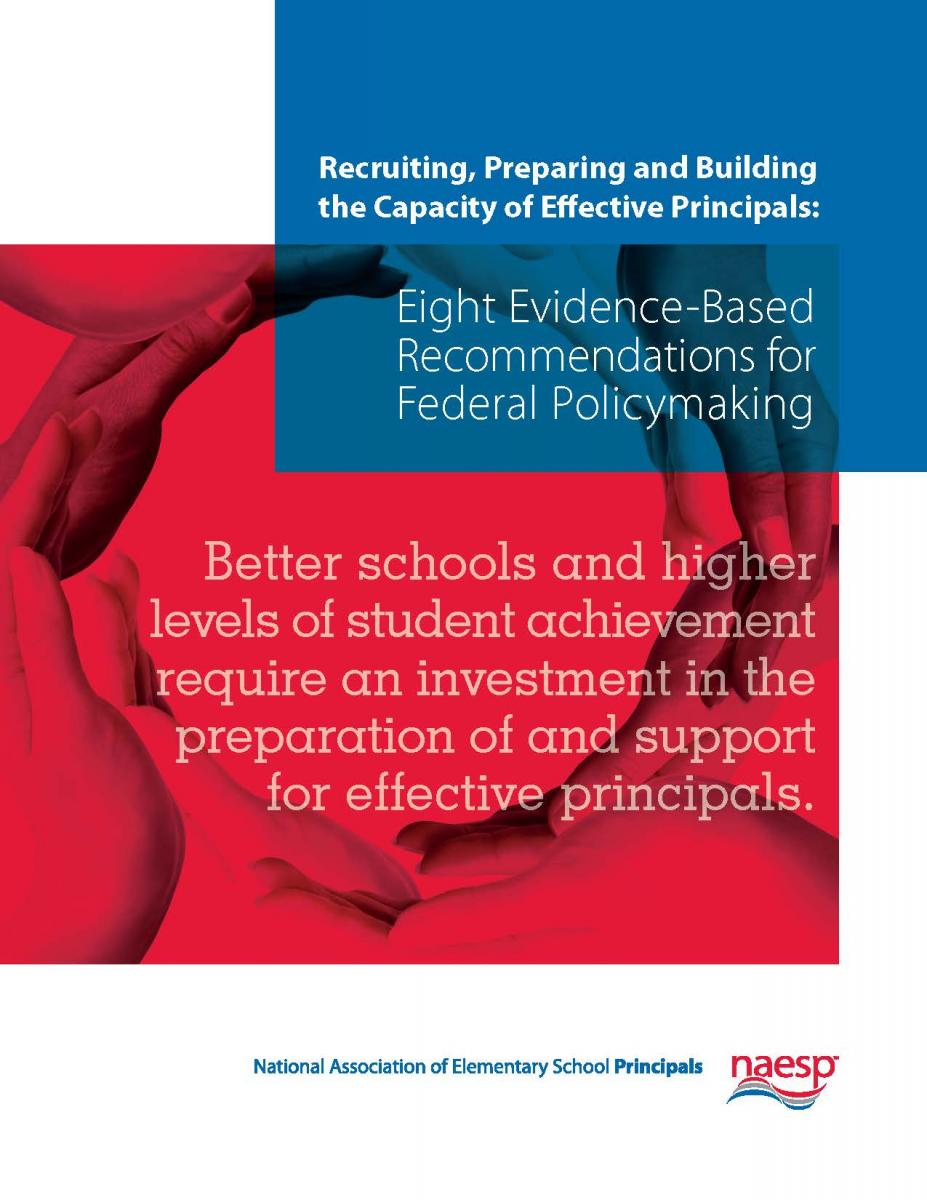Advocacy Update: A Policy Brief, A Principal Bill
By Kelly Pollitt Communicator April 2013, Volume 36, Issue 8 The 113th Congress is well underway. Now that the budget is set for the year, lawmakers will likely shift their focus to authorizing policies, including ESEA and other policies that have long been expired. Historically, principals have been overlooked in federal policy. But, NAESP’s latest policy brief offers ideas to guide policymakers to support principals—and now, NAESP is working to turn those recommendations into action. Recommendations
By Kelly Pollitt
Communicator
April 2013, Volume 36, Issue 8
The 113th Congress is well underway. Now that the budget is set for the year, lawmakers will likely shift their focus to authorizing policies, including ESEA and other policies that have long been expired.
Historically, principals have been overlooked in federal policy. But, NAESP’s latest policy brief offers ideas to guide policymakers to support principals—and now, NAESP is working to turn those recommendations into action.
Recommendations
 NAESP’s latest policy brief, “Eight Evidence-Based Recommendations for Federal Policymaking” spells out why and how federal governance structures in K-12 education must build the capacity of principals to improve schools. In other words: Federal policy should better recognize the role of principals. It should directly support their authority to “do more with less,” given both mounting budget constraints and the growing list of expectations to help students succeed that are placed on them.
NAESP’s latest policy brief, “Eight Evidence-Based Recommendations for Federal Policymaking” spells out why and how federal governance structures in K-12 education must build the capacity of principals to improve schools. In other words: Federal policy should better recognize the role of principals. It should directly support their authority to “do more with less,” given both mounting budget constraints and the growing list of expectations to help students succeed that are placed on them.
Over the coming months, NAESP will take the next step in the process, which requires turning the policy recommendations into legislative action.
Action
NAESP is working with colleagues at the National Association of Secondary School Principals (NASSP) and a host of other national education organizational partners to help shepherd the introduction of the School Principal Recruitment and Training Act of 2013. It will be sponsored by Sen. Al Franken (D-MN) and Rep. Susan Davis (D-CA), who have long noted the importance of strong school leadership.
- What the bill does: If passed, the School Principal Recruitment and Training Act of 2013 would create a competitive federal grant program to recruit, support, and prepare principals in high-need schools to improve academic achievement. It would create one-year residencies to train aspiring principals on instructional leadership, organizational management, and the use of data to inform instruction, and provide ongoing mentoring and support for at least two years after the principals complete the residency and commence work as principals.
The legislation will also put in place policies to provide ongoing, job-embedded professional development for current principals and assistant principals to strengthen their capacity to engage in effective instructional practices and the use of data for instruction, supervision, evaluation, and development of teachers.
To carry out these activities, districts could form partnerships with nonprofit organizations or higher education institutions to recruit, select, train, and support aspiring or current principals with track records of transforming student learning and outcomes and preparing the principals to lead the highest-need schools.
- Why the bill is important: The time has come for dedicated legislation to help support the role of principals. Training and professional development programs have not kept pace with the changing, dynamic, and complex role of the principal.
The bill states important findings that effective principals are essential to improving student achievement at high-need schools. There is virtually no documented instance of a struggling school that has been turned around without an accomplished principal. Yet all too often, principals and assistant principals enter the profession without having received the foundational instructional leadership skills needed for success.
Next Steps
To help advance the School Principal Recruitment and Training Act of 2013, NAESP will put in place a number of advocacy tools to help members and stakeholders in education (including teachers, parents, and superintendents) tell Congress to act on the bill and support strong principals to lead our nation’s schools.
NAESP will work on behalf of the nation’s principals and assistant principals who we know are responsible for the achievement of every child in their schools. School leaders deserve appropriate training, ongoing mentoring, and professional development to tackle challenges, such as the implementation of college and career-ready standards, teaching students of diverse backgrounds, and new teacher evaluation systems.
Every principal has a voice that is important in this advocacy initiative. To get involved, learn about the policy framework, and the legislation that will help build the capacity of principals, visit www.naesp.org/advocacy.
Kelly Pollitt is NAESP Associate Executive Director for Advocacy, Policy, and Special Projects.
Copyright © 2013 National Association of Elementary School Principals. No part of the articles in NAESP magazines, newsletters, or website may be reproduced in any medium without the permission of the National Association of Elementary School Principals. For more information, view NAESP’s reprint policy.

